The AMD 3rd Gen Ryzen Deep Dive Review: 3700X and 3900X Raising The Bar
by Andrei Frumusanu & Gavin Bonshor on July 7, 2019 9:00 AM EST** = Old results marked were performed with the original BIOS & boost behaviour as published on 7/7.
Benchmarking Performance: CPU Encoding Tests
With the rise of streaming, vlogs, and video content as a whole, encoding and transcoding tests are becoming ever more important. Not only are more home users and gamers needing to convert video files into something more manageable, for streaming or archival purposes, but the servers that manage the output also manage around data and log files with compression and decompression. Our encoding tasks are focused around these important scenarios, with input from the community for the best implementation of real-world testing.
All of our benchmark results can also be found in our benchmark engine, Bench.
Handbrake 1.1.0: Streaming and Archival Video Transcoding
A popular open source tool, Handbrake is the anything-to-anything video conversion software that a number of people use as a reference point. The danger is always on version numbers and optimization, for example the latest versions of the software can take advantage of AVX-512 and OpenCL to accelerate certain types of transcoding and algorithms. The version we use here is a pure CPU play, with common transcoding variations.
We have split Handbrake up into several tests, using a Logitech C920 1080p60 native webcam recording (essentially a streamer recording), and convert them into two types of streaming formats and one for archival. The output settings used are:
- 720p60 at 6000 kbps constant bit rate, fast setting, high profile
- 1080p60 at 3500 kbps constant bit rate, faster setting, main profile
- 1080p60 HEVC at 3500 kbps variable bit rate, fast setting, main profile
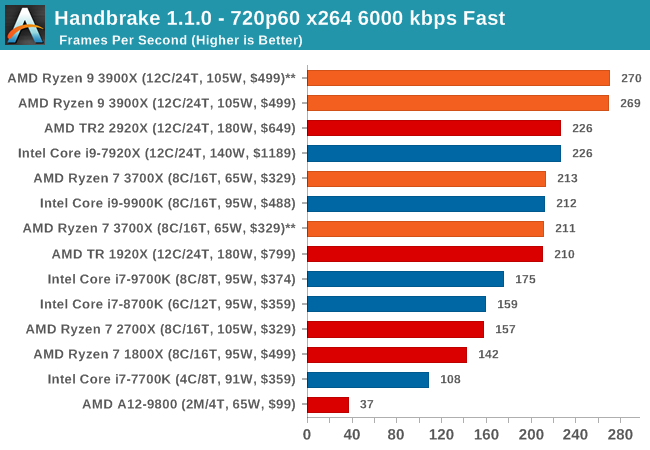
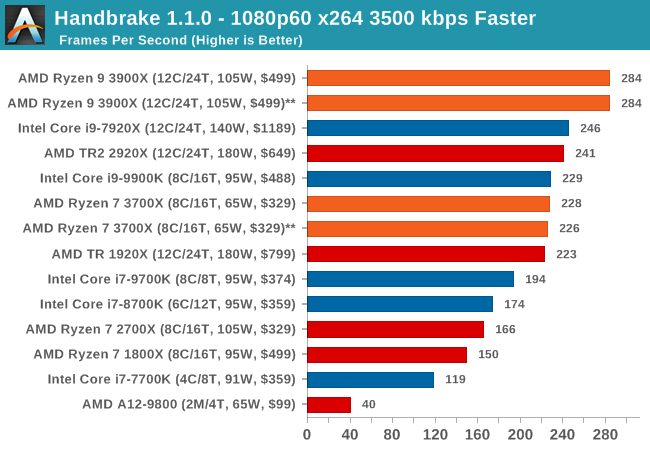
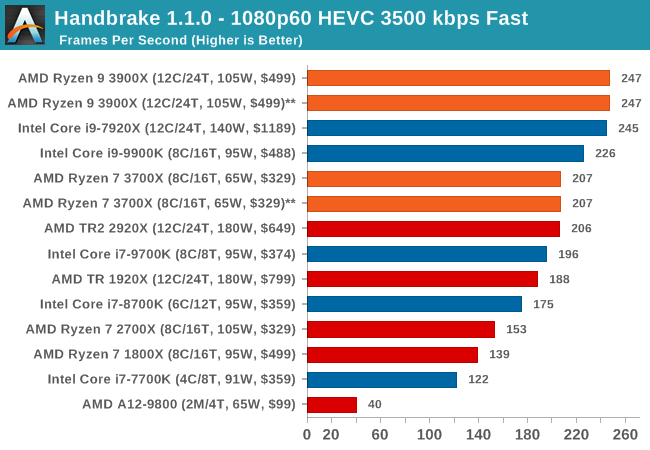
7-zip v1805: Popular Open-Source Encoding Engine
Out of our compression/decompression tool tests, 7-zip is the most requested and comes with a built-in benchmark. For our test suite, we’ve pulled the latest version of the software and we run the benchmark from the command line, reporting the compression, decompression, and a combined score.
It is noted in this benchmark that the latest multi-die processors have very bi-modal performance between compression and decompression, performing well in one and badly in the other. There are also discussions around how the Windows Scheduler is implementing every thread. As we get more results, it will be interesting to see how this plays out.
(Please note, if you plan to share the Compression graph, we'd appreciate it if you could please include the Decompression graph as well. Otherwise you’re only presenting half of the picture)
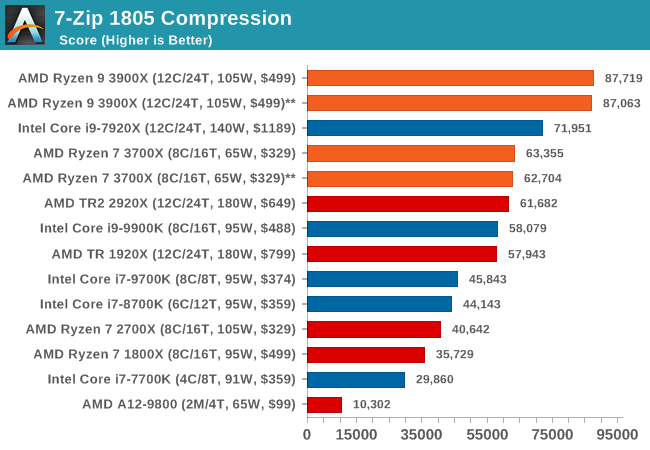
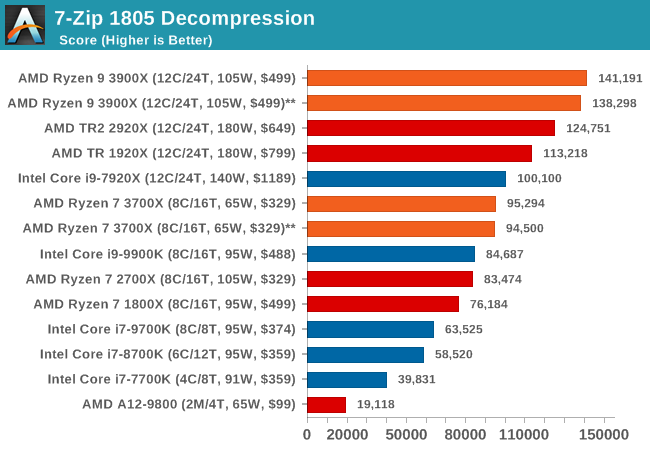
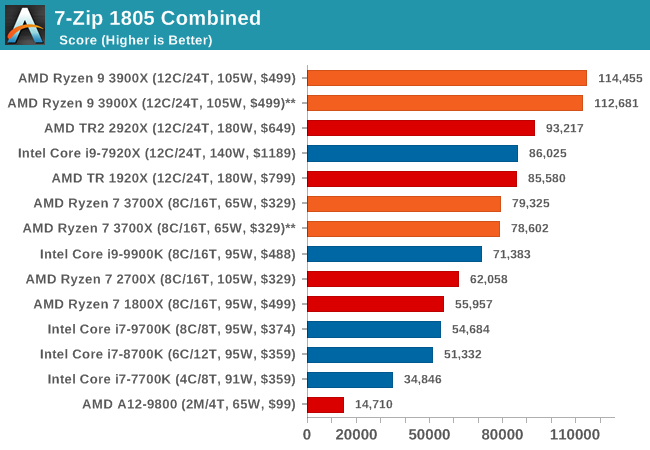
WinRAR 5.60b3: Archiving Tool
My compression tool of choice is often WinRAR, having been one of the first tools a number of my generation used over two decades ago. The interface has not changed much, although the integration with Windows right click commands is always a plus. It has no in-built test, so we run a compression over a set directory containing over thirty 60-second video files and 2000 small web-based files at a normal compression rate.
WinRAR is variable threaded but also susceptible to caching, so in our test we run it 10 times and take the average of the last five, leaving the test purely for raw CPU compute performance.
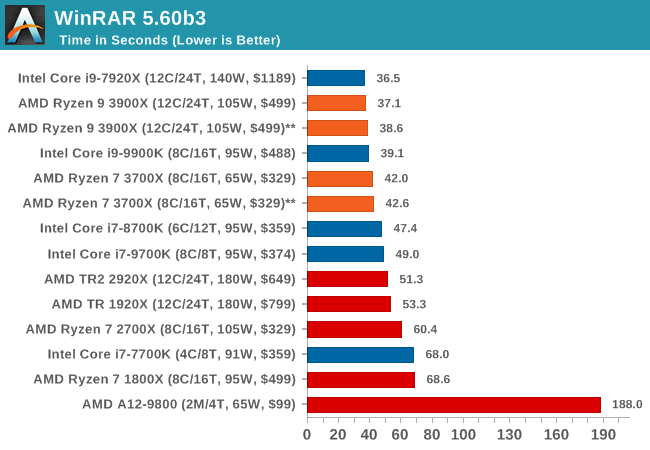
AES Encryption: File Security
A number of platforms, particularly mobile devices, are now offering encryption by default with file systems in order to protect the contents. Windows based devices have these options as well, often applied by BitLocker or third-party software. In our AES encryption test, we used the discontinued TrueCrypt for its built-in benchmark, which tests several encryption algorithms directly in memory.
The data we take for this test is the combined AES encrypt/decrypt performance, measured in gigabytes per second. The software does use AES commands for processors that offer hardware selection, however not AVX-512.
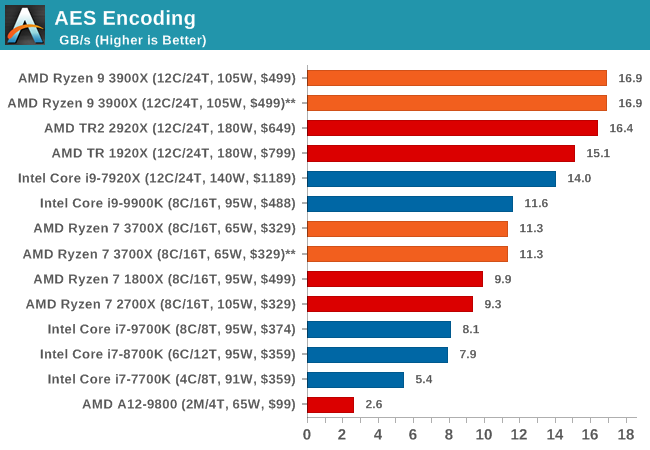










447 Comments
View All Comments
Tkan215 - Monday, July 8, 2019 - link
I dont think so its not easy to refine 10nm like you think how many year it take Intel to refine 10nm it has been already 4 to 5 years dont get your hope up. If volume aint there there is no chance. AMD surelly moving to 7nm euv quicker then 5nmTkan215 - Monday, July 8, 2019 - link
I havent seen them drop any price i9900k went back up at amazon.com. Intel continue to ignore, non response and not caring for their competition. they want their margin this is all this company care about not your feeling or desireTEAMSWITCHER - Sunday, July 7, 2019 - link
It's summer time in Michigan and I have no desire to upgrade right now... I can wait for the flagship 3950X in September.Maxiking - Sunday, July 7, 2019 - link
Local anandtech yield and node experts got hit again. I wonder how many hits you can take before you shut up.As predicted, Intel still faster in games and AMD OC ability more or less unchanged, slighty worse. It is a new node after all buy yeah, you know better, so keep dreaming about those 5ghz on the majority of chips.
Teckk - Sunday, July 7, 2019 - link
So more cores at the same TDP as 2000 series Ryzen is nothing? Ok.Maxiking - Sunday, July 7, 2019 - link
That isn't the thing I was talking about. My point was that local experts, I mean, trolls, know nothing about the manufacturing cost, yields, about the node in general. As it has been showed recently in the reviews, OC ability of the chips is terrible and lower core count parts tend to perform worse, reaching only 4.1 - 4.2 ghz.Teckk - Sunday, July 7, 2019 - link
Ah, got it. It is an improvement, but not good enough.Maxiking - Sunday, July 7, 2019 - link
It is good enough in terms of competition and that we can get things cheaper.But not when the raw performance is tconsidered. It is a hypothetical scenario, but had there been no 10 nm problems for Intel, AMD would have been in the bulldozer position again.
catavalon21 - Sunday, July 7, 2019 - link
I haven't owned an AMD CPU since my K500 a very long time ago, but let's call it what it is - AMD has a CPU at the $500 price point that Intel is charging $1200 presently to compete with, and Intel's solution uses far more power. That's a win for AMD in any domain.imaheadcase - Sunday, July 7, 2019 - link
The problem is that the PC market is stagnant atm, if you are already a intel owner, absolutely no reason to upgrade to amd CPU. Most people who have systems now don't really have any need to upgrade like it used to be.He stated in article it took amd 15 YEARS to get this good CPU finally out and sounded like he was impressed by that?
Its a impressive CPU, but lets be real here, Intel has dominated the market already for years because it has better marketing, better suppliers.
Based on previous article comments, most people are still rocking 2600K CPU..FROM 2011! They still are very good CPU.
Thats not counting the price difference, while yes the one intel cpu is crazy expensive, its not a normal CPU most people have to go by, if you a regular user with the previous mentioned 2600K CPU..that requires a total system overhaul if you wanted to go AMD route...which to be honest is a risk on betting that a new amd system is not going to last as long as a 2600K did for you.